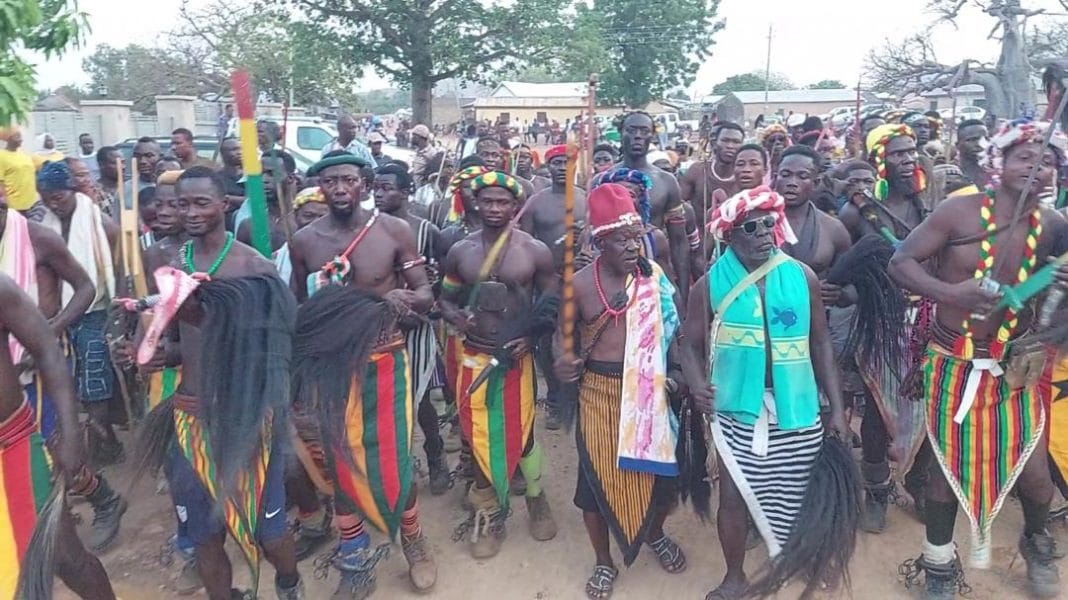The chiefs, Tindamas, and people of the Talensi Traditional Area in the Upper East Region on Sunday, successfully climaxed the annual Golob Festival, a deeply spiritual and cultural event that marks the beginning of the farming season. This age-old festival celebrated throughout March, is a sacred period dedicated to seeking the blessings of the gods for fertile lands, abundant rains, and a bumper harvest.
More than just an agricultural ritual, the Golob Festival is a time for unity, purification, and cultural preservation. It is a period when the Talensi people reconnect with their traditions, renew their faith in their ancestral deities, and strengthen communal bonds.
During the month-long celebration, the Talensi land is considered sacred, and the people strictly adhere to a set of customs and taboos aimed at ensuring purity and order. Marriage ceremonies, extramarital affairs, noise-making, and even mourning the dead are strictly forbidden. Bloodshed in any form is also prohibited, reinforcing the festival’s emphasis on peace and harmony.
“With your wife, it is allowed to have sex with, but outside marriage, it is not accepted. And if one goes wayward within our community, a song is composed to deter others from doing same,” Jacob Omboehyin, leader of the Wakii Golob dancing group.
The festival also dictates a unique dress code for both men and women. Indigenous men wear short knickers and animal skin, leaving their chests bare, with towels draped around their necks, symbolizing strength and masculinity. Women, on the other hand, adorn themselves in long towels covering them from chest to knee level, with their heads wrapped in cloth, a sign of purity and respect for tradition.
A highlight of the Golob festival is the invigorating week-long Golob dance, a spectacular display of Talensi culture, music, and spiritual energy. The festival ignites a sense of belonging and community spirit, as indigenous songs and dances take center stage in communities such as Wakii, Gorog, Tengzuk, Shia, Gbeogo, Gorogo, Yindure, and Separd.
The Golob dance is not merely for entertainment—it is a sacred ritual believed to usher in blessings, cleanse the land of negative energies, and prepare the people for the challenges of the farming season ahead.
“Today, the Tongraan will give millet to the Tindaamas present here and when they get back to their communities, it will then be distributed to all corners of the traditional area. So, when you are going to sow, no matter how small that particular millet is, mix it with the millet you are going to sow. We believe that by doing so, the gods will help us to get a bumper harvest. And once we talk to our ancestors, we will come out of the farms without any harm. We have snakes, and scorpions on the farms and once we do that, it will prevent us from attacks,” Naab Nyakora Mantii, the Chief of Baare stated.

Among the dignitaries who graced the occasion was Daniel Dung Mahama, the Member of Parliament for Talensi, who commended the people for upholding their culture and fostering unity through the Golob Festival.
“In a time when modernization threatens to erode our cultural values, it is refreshing to see the people of Talensi hold firmly to their traditions. Golob is more than a festival—it is a heritage that must be passed down to future generations. The number of people around here signified unity, peace, and love for one another. One thing about the festival is to remember our great ancestors, where they came from, and how they came together as one,” the MP stated.

For Rockson Bukuari from the Gbeogo community, the Golob Festival is not only about ushering in the rainy season but also about fostering unity among the Talensi people.
“Beyond being a spiritual exercise, Golob strengthens the bond among the Talensi people. It reminds us of our shared identity, our ancestral roots, and our commitment to preserving the customs of our forefathers,” he noted.
A1Radioonline.com|101.1Mhz|Joshua Asaah|Tongo




